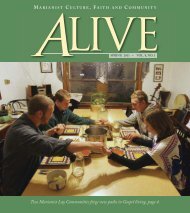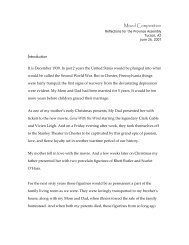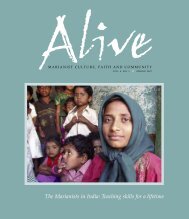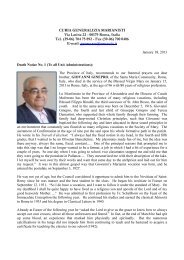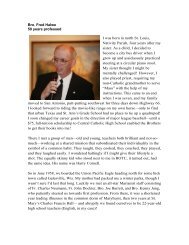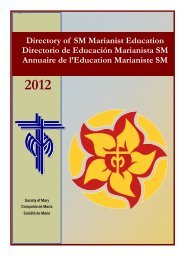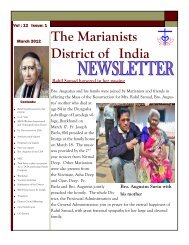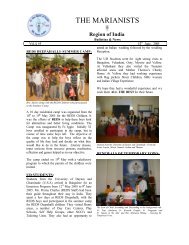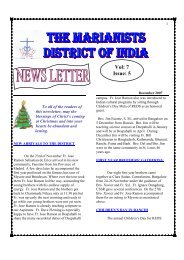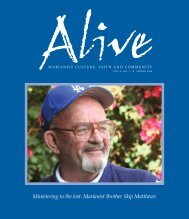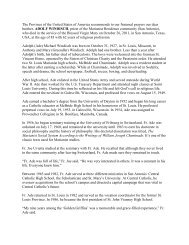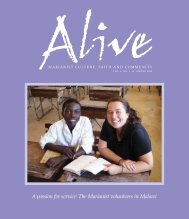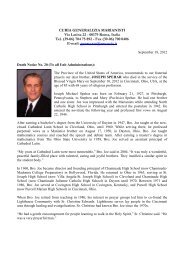PROVIDE AN INTEGRAL, QUALITY EDUCATION - The Marianists
PROVIDE AN INTEGRAL, QUALITY EDUCATION - The Marianists
PROVIDE AN INTEGRAL, QUALITY EDUCATION - The Marianists
Create successful ePaper yourself
Turn your PDF publications into a flip-book with our unique Google optimized e-Paper software.
<strong>PROVIDE</strong> <strong>AN</strong> <strong>INTEGRAL</strong>, <strong>QUALITY</strong> <strong>EDUCATION</strong><br />
A. Promote quality education of the whole person<br />
<strong>The</strong> Marianist school educates the whole person, developing the individual’s physical,<br />
psychological, intellectual, moral, social, and creative qualities. Students in Marianist<br />
schools cultivate their personal talents, nourishing the desire and acquiring the skills that<br />
will equip them to be learners all their lives. <strong>The</strong> Marianist educational philosophy favors<br />
the development of quality institutions which promote a solid liberal arts education and<br />
combine it with professional and technical education as the needs of their students<br />
require.<br />
B. Provide coherent curricula, a well formed, professional,<br />
administration, faculty, and staff; and adequate facilities and<br />
finances.<br />
<strong>The</strong> curriculum is a school’s primary vehicle for education; the school’s environment its<br />
primary context for learning. <strong>The</strong> witness of faith and the ethical living of the educational<br />
community have their necessary complement in curricula of coherent scope and<br />
sequence. Marianist pedagogy inspires administration, faculty, and staff to develop and<br />
continually improve their own distinctive professional capacities. <strong>The</strong> administration and<br />
board of trustees or council of directors provide thoughtful stewardship of the school’s<br />
resources, especially personnel, facilities, and finances.<br />
C. Develop respect for the dignity of the person as a daughter or son<br />
of God, unique and individual.<br />
We encourage students, challenge them, and respect their differences by adapting<br />
teaching styles to their individual needs and abilities. In all the activities of school life,<br />
students and teachers together develop each other’s skills and strengthen mutual selfesteem.<br />
But because Marianist educational communities exist not only for the benefit of<br />
their members, concern for human rights and responsibilities and for the meaning of life<br />
permeates the curriculum and the daily life of the school.<br />
D. Develop an interior spirit and self-knowledge<br />
Blessed Chaminade said, “<strong>The</strong> essential is the interior.” To strengthen the interior life, we<br />
provide time inside and outside of class for nurturing habits of silence and reflection.<br />
<strong>The</strong>se habits help foster discerning self-knowledge, critical thinking, and prudent<br />
judgment. Students learn to use their understanding and imagination to probe the<br />
meaning and consequences of data, facts, and events. <strong>The</strong>y learn, too, that all the<br />
academic disciplines are valuable resources for contemplating ourselves and the world in
the light of the gospel and our philosophy of education. Deepening the interior life,<br />
paradoxically, better fits us to take action for wise and purposeful ends.<br />
E. Develop a concern for global and local issues of culture, ecology,<br />
and the use of technology.<br />
As part of a global network of educational apostolate, Marianist educators see all people<br />
as brothers and sisters. Access to educational technology for our students is a matter of<br />
justice and a critical aid to their quest for learning and understanding. Students learn,<br />
however, to regard and evaluate technology as a tool, useful in the stewardship of the<br />
world’s resources and the service of humanity. Including environmental concerns in our<br />
educational theory and practice acknowledges the value of all life and expresses our<br />
assent to cooperating with God’s creation.<br />
F. Foster a diverse faculty and staff as well as a diverse student<br />
body.<br />
<strong>The</strong> Marianist school is open to faculty, staff, and students who bring diverse experiences<br />
to supporting the mission. We welcome students from various ethnic and economic<br />
backgrounds and educate students with differing abilities and gifts. Individuals aware of<br />
their own distinctive talents and heritage are better able to appreciate those of others.<br />
<strong>The</strong>refore, in honoring the variety of people in our schools, we encourage them to use<br />
their gifts toward the common good.<br />
G. Offer Mary as a model of integrity in relation to the realities of<br />
the world.<br />
Mary’s visit to Elizabeth urges us all to prompt service and deep presence. Her fidelity<br />
on Calvary immerses us in solidarity with the suffering. And her place at Pentecost in<br />
company with the other disciples calls us all to collaborate in the Church’s evangelical<br />
mission. In her spirit, the Marianist school in its scholastic and extracurricular endeavors<br />
balances an active life with prayer, reflection, and service.
GENERAL PRACTICES FROM THE CHARACTERISTICS OF<br />
MARI<strong>AN</strong>IST <strong>EDUCATION</strong><br />
• We seek to develop habits to help foster discerning self-knowledge, critical<br />
thinking, and prudent judgment<br />
• Learning situations are structured to develop an understanding and appreciation<br />
for all forms of life, global issues, and stewardship of the earth.<br />
• We strive to incorporate the Catholic Church’s teaching on social justice in all<br />
academic disciplines.<br />
• Vocational choices are presented in the Pastoral Program, the Religion<br />
curriculum, and in the other academic disciplines offered at the school<br />
MARI<strong>AN</strong>IST QUOTES<br />
• “Marianist education is directed towards promoting the integral development of<br />
the person, leading students to the acquisition of human knowledge, helping them<br />
to develop critical thought and stimulating their yearning for truth, both in the<br />
theoretical realm and in everyday life.” (Marianist Rule of Life, 1983)<br />
• “Above all the educator should help the student to become aware of his (her) own<br />
capacities and stimulate growth. It is not so much a question of sowing some new<br />
seed in the soul of the child as it is of cultivating and protecting what is already<br />
there.” (Julian Gonzalez, S.M.)<br />
• “Study, discipline, devotion, and work are the cornerstones of the great edifice of<br />
life. Teachers are more than mere academic guides. <strong>The</strong>y should be involved in<br />
the lives of their students and take a personal interest in the intellectual,<br />
emotional, moral, and spiritual development of each of them.” (Domingo Lazaro,<br />
S.M.)<br />
• “To be Christian, it is necessary to be fully human. Nobody complies with the law<br />
of grace who has not first complied to the full with the law of nature. To educate a<br />
child is to work to transform that child into a perfect human being, by seeking the<br />
complete, not practical development of that child’s physical, intellectual and<br />
moral capabilities.” (Joseph Simler, S.M.)<br />
• “I am strongly desirous that the schools . . .measure up to the standards set by<br />
ours and that they may become models for all others of the diocese . . . . If we<br />
intend to do business by halves, it will not be worth the while to take so much<br />
trouble . . . . Above all I am determined to form really good establishments, before<br />
being solicitous about their numbers.” (Chaminade, Letters, vol. I, June 18, 1822.)
• “We don’t educate for the school, not merely for the years one is in school, but for<br />
life.” (F. Armentia, S.M.)<br />
• “A child and a young person really ought to educate themselves since they cannot<br />
truly assimilate what they have not yet personally encountered, experienced, and<br />
decided for themselves.” (Paul J. Hoffer, S.M.)<br />
Practices in Marianist Sponsored Schools<br />
Integral, Quality Education<br />
Descriptors<br />
o Promote quality education of the whole person<br />
o Provide coherent curricula; a well-formed, professional, administration, faculty,<br />
and staff; and adequate facilities and finances<br />
o Develop respect for the dignity of the person as a daughter or son of God, unique<br />
and individual<br />
o Develop an interior spirit and self-knowledge<br />
o Develop a concern for global and local issues of culture, ecology, and the use of<br />
technology<br />
o Foster a diverse faculty and staff as well as a diverse student body<br />
o Offer Mary as a model of integrity in relation to the realities of the world
Practices<br />
• Mary is presented as the model of integrity in relation to the realities of the world<br />
• Departmental philosophies, departmental objectives, and individual course syllabi<br />
state the interconnectedness of the various academic areas, evidence the social<br />
teachings of the Catholic Church and the Society of Mary<br />
• <strong>The</strong> religion curriculum develops Marianist themes over four years<br />
• Moral education is advanced throughout the curriculum<br />
• Religion is required for each year a student attends the school<br />
• <strong>The</strong> development of the whole person is evident in the educational program of the<br />
school<br />
• An active dialogue between faith and culture is found in each class<br />
• Faculty and staff regularly articulate the conviction that the school forms a<br />
community of life-long learners<br />
• Students are taught to appreciate and value the differences of people throughout<br />
the world<br />
• Curriculum development is proactive and not reactive<br />
• Appropriate and continuous evaluation is done of the academic program,<br />
instructional methodologies, etc.<br />
• Student academic excellence is publicly recognized<br />
• Academic standards are clearly stated<br />
• <strong>The</strong> school is an active member of an accreditation organization<br />
• <strong>The</strong>re are clear expectations of academic excellence<br />
• <strong>The</strong>re is a clear articulation of learning expectations and educational services to<br />
be offered students<br />
• <strong>The</strong> curriculum provides appropriate courses and teaching strategies to assist<br />
students of a variety abilities and learning styles<br />
• Student international exchange programs are offered<br />
• Environmental issues are discussed<br />
• <strong>The</strong> school demonstrates the value and its support for the fine arts<br />
• <strong>The</strong>re are a variety of co-curricular activities and the activities are viewed as<br />
integral to the school’s total educational program<br />
• Teachers are involved in co-curricular activities<br />
• Parents are involved in co-curricular<br />
• Teachers are encouraged to work for continued professional development<br />
• Faculty in-service programs are offered to assist teachers in their instructional<br />
responsibilities<br />
• Critical thinking skills are part of the curriculum<br />
• All curriculums are reviewed on a regular basis<br />
• Character development is part of the school’s philosophy and offered across the<br />
curriculum<br />
• Teachers and counselors promote academic excellence<br />
• <strong>The</strong> Fine Arts are integral to the school’s curriculum<br />
• <strong>The</strong> larger community is used to enhance the educational program
• Students are taught about and discuss various vocations – vowed religious life,<br />
priesthood, and committed lay ministry<br />
• Educational programs are available for parents<br />
• Vowed <strong>Marianists</strong> actively participate in providing an integral, quality,<br />
educational program<br />
• Vowed <strong>Marianists</strong> are an active presence at various school sponsored activities<br />
As A Marianist Educator<br />
<br />
<br />
<br />
<br />
<br />
<br />
<br />
<br />
<br />
<br />
<br />
<br />
<br />
<br />
<br />
<br />
<br />
<br />
<br />
<br />
<br />
<br />
<br />
<br />
I expect the student to display multiple ways of illustrating comprehension of the<br />
subject matter<br />
I counsel the “whole” student to become a “whole” person<br />
I have a clear syllabus for students<br />
I understand and employ methodology that addresses various learning styles<br />
I refer to various academic disciplines to illustrate teaching points<br />
I expect students to display proper writing skills across the curriculum<br />
I teach the student to mentor other students<br />
I present ideas, information in a cohesive, engaging manner<br />
I regularly incorporate new ideas into my course work<br />
I encourage students to consider various vocational ministries<br />
I create a student centered classroom<br />
I refrain from gossiping about members of the school community<br />
I provide opportunities for individual expression<br />
I address issues of diversity, sexism, and ecological awareness<br />
I provide time for student reflection<br />
I stimulate student thinking through appropriate questioning methods<br />
I allow the student to question conventional thinking<br />
I challenge the student to set high, but achievable goals<br />
I create a classroom atmosphere where student-generated questions are welcome<br />
I encourage students to employ the use of the school’s guidance services<br />
I keep up to date on development in the educational field and my academic<br />
discipline<br />
I attend workshops, seminars, etc. for professional growth<br />
I work with other teachers in creating cross-discipline learning experiences for<br />
students<br />
I am open to educational experiences for students that may effect my class period



